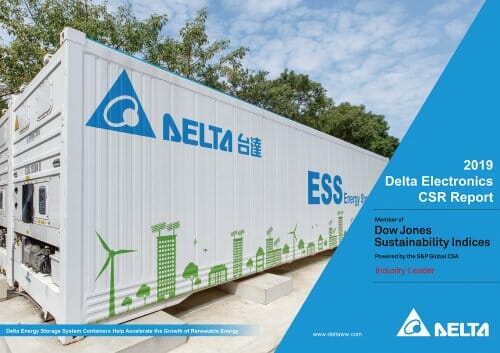Named Industry Leader in Electronic Equipment, Instruments, and Components for the Fifth Time in Three Consecutive Years
For Delta Electronics’ active response to the severe challenges of climate change, the company has been selected for several of the 2020 Dow Jones Sustainability Indices (DJSI). Delta was named to DJSI World for the tenth consecutive year, as well as industry leader in electronic equipment, instruments, and components for the fifth time in three consecutive years, and also selected for the DJSI Emerging Markets for the eighth consecutive year. In 2020, Delta continues to be highly competitive in the DJSI’s evaluations of the world’s leading companies. In addition to obtaining the highest environmental scores in the industry, Delta’s total environmental and social score set a record high. DJSI awarded Delta the highest scores for seven major items in the global electronic equipment industry, commending Delta’s emphasis on and implementation of the three sustainability dimensions of environment, society, and corporate governance (ESG). In particular, Delta responded to climate change by setting a science-based target (SBT) of 56.6% in 2017, after which its renewable energy use in 2019 reached 44.1% to achieve its 2019 target of a 29% reduction in carbon intensity.
Mr. Jesse Chou, Chief Sustainability Officer of Delta, said that Delta actively implements its corporate mission: “To provide innovative, clean, and energy-efficient solutions for a better tomorrow.” Delta invests around 8% of its total revenue every year in innovative research and development (R&D), continues to develop more eco-friendly products and solutions based on the core technology of power electronics, and strives to conserve energy and reduce carbon emissions, while fully disclosing the company’s goals and performance in ESG to fulfill its corporate social responsibility. Delta has reached its SBT for two consecutive years, and the proportion of renewable energy it uses has increased significantly to 44.1% to actively contribute to keeping global warming below 1.5ºC. In addition, Delta has called on the public to pay attention to water issues through a tour of its 8K environmental documentary “Water with Life in Taiwan” launched by Delta’s foundation to educate society.
Delta’s various efforts have received high recognition by the outside world. In the latest DJSI evaluation, Delta obtained the highest scores for seven items in the global electronic equipment industry, including four full scores in “Innovation Management,” “Environmental Reports,” “Social Reports,” and “Climate Strategy” as well as the highest scores in “Code of Conduct”, “Product Responsibility,” and “Human Rights Management.” This demonstrates Delta is not only dedicated to investing in innovation and R&D, improving resource efficiency and increasing the proportion of renewable energy it uses, but that Delta also pays attention to human rights and takes into account ESG development. This has resulted in DJSI naming Delta an industry leader a total of five times in three consecutive years.
Delta’s ESG evaluation and investment has received much attention from stakeholders in recent years on sustainability-related policies, management systems, as well as data and indicators. Delta refers to various aspects and results of the ESG evaluation as it continues to improve its internal organization and to incorporate sustainability concepts into its daily operations. At present, Delta has implemented as many as 2,036 energy-saving projects at its plants and it purchases International Renewable Energy Certificates (I-RECs). The proportion of all of its renewable energy use has reached 44.1%, with an aim to keeping global warming below 1.5°C. Delta also passed a Science Based Targets initiative (SBTi) review in 2017 and proposed a target of reducing carbon intensity by 56.6% by 2025 with 2014 as the base year. Delta was the first enterprise in Taiwan and the 87th in the world to have passed the review. As for low-carbon transportation, Delta joined the International Electric Vehicle Initiative of EV100 in 2018 as the first global member that is an electric vehicle energy infrastructure provider. Delta has set a target for fully switching to electric vehicles (EV) and setting up many EV charging stations at the company by 2030. In 2020, Delta has already installed many charging stations at its major plants in Taiwan and at bases in 22 cities around the world for its colleagues and clients. Delta is also actively developing a circular economy model. In 2019, the Dongguan Plant introduced the Zero Waste to Landfill (UL 2799) standard, which has been awarded the highest platinum certification, and achieved a 100% waste conversion rate (8% from incineration heat recovery). In addition to Delta’s own efforts in energy conservation and carbon reduction, it continues to invest in R&D to improve the efficiency of its power products and help clients around the world save electricity. From 2010 to 2019, Delta has saved a total of 31.4 billion kWh of electricity, which is the equivalent to 16.74 million tons of carbon emissions reduced on a global scale.
In order to strengthen talent competitiveness and promote sustainable development, Delta proactively recruits key talents from universities and colleges around the world, expands its internal knowledge platform and expert community, and facilitates diversified innovation. The company provides a care system superior to what is stipulated in the law to take care of employees through comprehensive health management and to help them achieve work-life balance. Delta also continues to promote sustainability concepts to society through the 8K environmental documentary “Water with Life in Taiwan” launched by the Delta Electronics Foundation for educational purposes. The documentary has been seen by tens of thousands of viewers, including government policy makers as well as corporate and media executives, as it calls their collective attention to critical water resource issues.




